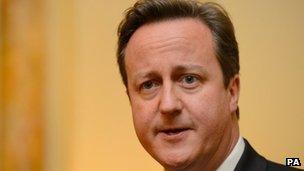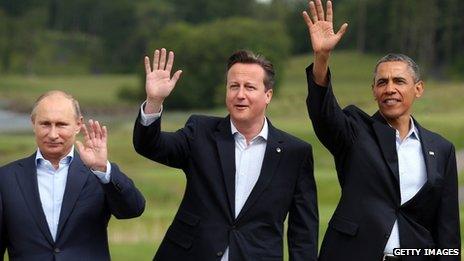Secret owners of 'shell' companies to be made public
- Published

David Cameron will speak at the Open Government Partnership summit later
A list of the owners of "shell" companies where firms keep money offshore to avoid tax will be published to discourage tax evasion, David Cameron has announced.
The prime minister said the "cloak of secrecy" surrounding company ownership had lead to "questionable practice and downright illegality".
Mr Cameron made tax transparency a key theme of the recent G8 summit.
Labour, anti-corruption campaigners and charities welcomed the move.
The prime minister said making the register public would make it easier for firms and developing countries to know who they were doing business with.
Speaking at the Open Government Partnership summit in London, Mr Cameron said a small minority of companies have hidden their business dealings in a "complex web of shell companies" for too long.
'Untraceable trails'
"This cloak of secrecy has fuelled all manner of questionable practice and downright illegality," he said.
"Illegality that is bad for the developing world - as corrupt regimes stash their money abroad under different identities.
"And illegality that is bad for Britain's economy too - as people evade their taxes through untraceable trails of paperwork.
He said the practice held back tax cuts for business as a whole: "To keep corporate taxes low, you've got to keep corporate taxes coming in. As I've put it, no tax base - no low tax case."
The central register of company beneficial ownership will be made available to the public.

World leaders discussed tax avoidance and evasion at the G8 earlier this year
Mr Cameron also urged other world leaders to live up to commitments they made at the G8 summit, which was held in Northern Ireland.
Shadow treasury minister Shabana Mahmood welcomed the announcement of the public register but said the government must go "much further to tackle tax avoidance".
"With the amount of uncollected tax rising in the last year to £35bn, it's clear this government is failing," she said.
She accused the government of failing to close tax loopholes and said it should be "doing more to open up tax havens".
There is a distinction between tax avoidance - legal measures to avoid paying tax - and illegal tax evasion.
Getaway cars
Roger Barker, of the Institute of Directors, also welcomed the move, saying it was "right that the true owners of companies should be transparent both to the company itself and the wider business community".
He added: "Significant practical challenges remain in order to ensure that any register of beneficial ownership is accurate and robust, but we support government efforts to begin this process".
The CBI also welcomed the plan for a central register of company beneficial ownership.
Chief policy director Katja Hall said: "Businesses back the creation of a beneficial ownership register which will support efforts to promote transparency and stamp out illicit financial activity.
"The real prize is the ability to track ownership information around the world. Now that the UK has chosen to make this a public register, ensuring that others follow our lead will be critical to its success and to maintaining a level playing field."
Gavin Hayman, of anti-corruption campaigners Global Witness, said: "Anonymous shell companies are the global getaway cars for crime, corruption and tax evasion.
"Full credit should go to the prime minister and the business secretary (Vince Cable) for acting to take away the keys."
Red tape fears
And Chris Bain, director of aid charity Cafod, said: "It is both the right thing to do as it will support the global fight against money laundering and tax evasion, and also shows that the government has listened to public opinion."
He said the register would be "vital" for those fighting to prevent money intended for poverty eradication being "siphoned off".
But the British Chambers of Commerce warned that the register could add to the burden of red tape for some companies.
BCC Director of Policy Adam Marshall said: "Most British businesses already have transparent ownership structures, and put clarity and trust at the heart of their corporate governance arrangements.
"However, many will be concerned that the introduction of a universal register of beneficial ownership could create unintended consequences for law-abiding businesses, such as increased regulatory and reporting burdens.
"Ministers must work with business to address these concerns over the coming weeks, and ensure the UK doesn't go it alone when it comes to good corporate governance."
- Published6 September 2013
- Published20 July 2013
- Published18 June 2013